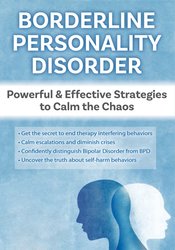

Volatile, hostile, exasperating, and frequently in crisis, individuals with Borderline Personality Disorder (BPD) leave everyone in their path confused, frustrated, or even frightened.
In therapy, clients with BPD quickly wear you out as they attempt to undermine therapeutic boundaries and turn therapy into an endless series of crises to manage.
You’re left feeling frustrated and ineffective as your treatment efforts fall short again and again with clients who find comfort in chaos.
But it doesn’t need to be this way!
In this recording, Dr. Gregory W. Lester will guide you through cutting-edge methods, empirically-proven to manage and treat the behaviour of this often-bewildering client population.
Watch him as he reveals critical details on the successful treatment of BPD that you’ve never heard before.
And not only do the unique treatment strategies he’ll share work, but his expert guidance will give you the confidence you need to more skillfully calm down escalations, reduce self-harming behaviours, and diminish crises at your very next session.
Don’t miss out – this practical, hands-on seminar recording is a must-have training for all clinicians, purchase today!
| File type | File name | Number of pages | |
|---|---|---|---|
| Manual - Borderline Personality Disorder (802.2 KB) | 155 Pages | Available after Purchase |

Gregory W. Lester, Ph.D., is a clinical, consulting, and research psychologist with practices in Colorado and Texas. Dr. Lester has presented over 2,000 personality disorders trainings to over 200,000 professionals in every major city in the United States, Canada, and Australia. In his nearly 40 years of clinical practice, Dr. Lester has treated over 1,000 personality disorder cases and has performed psychological evaluations on over 2,500 individuals.
Dr. Lester has served on the graduate faculty of The University of St. Thomas and as a special consultant to The United States Department of Justice. Dr. Lester’s office served as one of the original research sites for the DSM-5® revision of the personality disorders section where he collaborated with Emory University, the New York State Psychiatric Group, The University of Missouri, The University of Kentucky, and the late Dr. Robert Spitzer, chairman of the DSM-3 committee.
Dr. Lester is a member of the American Psychological Association, the Texas Psychological Association, and the Colorado Psychological Association. He is the author of nine books, including Power with People, a manual of interpersonal effectiveness, Shrunken Heads, an irreverent memoir of his graduate school training, and Diagnosis, Treatment, and Management of Personality Disorders, which is the largest-selling front-line clinical manual on diagnosing, treating, and managing personality disorders.
Dr. Lester’s research and articles have appeared in publications including The Journal of the American Medical Association, The Western Journal of Medicine, The Yearbook of Family Practice, The Journal of Behavioral Therapy, The Journal of Marriage and Family Therapy, The Handbook of Depression, Transactional Analysis Journal, Living Word Magazine, The Priest Magazine, and The Houston Lawyer.
Speaker Disclosures:
Financial: Dr. Gregory Lester maintains a private practice. He is a consultant for Improvement Research Group. He is a published author and receives royalties. Dr. Lester receives a speaking honorarium, recording royalties, and a consulting fee from PESI, Inc. He has no relevant financial relationships with ineligible organizations.
Non-financial: Dr. Gregory Lester is a member of the American Psychological Association, the Texas Psychological Association, and Colorado Psychological Association.
What You Need to Know that You’ve Never Heard Before
Unique Assessment and Diagnostic Considerations for BPD
A Step-by-Step Guide to Create a Treatment Plan that Works
Successful Approaches to Manage Difficult Behaviors
Treatment Interventions to Repair the Disordered Self
Strategies to Keep Your Clients Safe from Self-Harm and Suicidal Behaviors
Practitioner Issues – Precautionary Techniques
Please wait ...